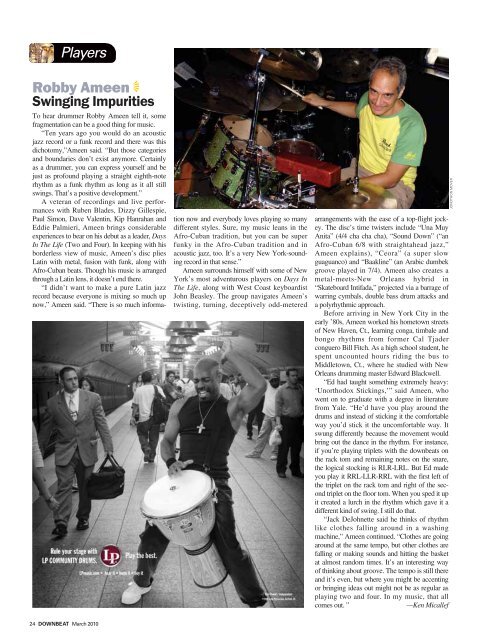Download - Downbeat
Download - Downbeat
Download - Downbeat
You also want an ePaper? Increase the reach of your titles
YUMPU automatically turns print PDFs into web optimized ePapers that Google loves.
Players<br />
Robby Ameen ;<br />
Swinging Impurities<br />
To hear drummer Robby Ameen tell it, some<br />
fragmentation can be a good thing for music.<br />
“Ten years ago you would do an acoustic<br />
jazz record or a funk record and there was this<br />
dichotomy,”Ameen said. “But those categories<br />
and boundaries don’t exist anymore. Certainly<br />
as a drummer, you can express yourself and be<br />
just as profound playing a straight eighth-note<br />
rhythm as a funk rhythm as long as it all still<br />
swings. That’s a positive development.”<br />
A veteran of recordings and live performances<br />
with Ruben Blades, Dizzy Gillespie,<br />
Paul Simon, Dave Valentin, Kip Hanrahan and<br />
Eddie Palmieri, Ameen brings considerable<br />
experiences to bear on his debut as a leader, Days<br />
In The Life (Two and Four). In keeping with his<br />
borderless view of music, Ameen’s disc plies<br />
Latin with metal, fusion with funk, along with<br />
Afro-Cuban beats. Though his music is arranged<br />
through a Latin lens, it doesn’t end there.<br />
“I didn’t want to make a pure Latin jazz<br />
record because everyone is mixing so much up<br />
now,” Ameen said. “There is so much information<br />
now and everybody loves playing so many<br />
different styles. Sure, my music leans in the<br />
Afro-Cuban tradition, but you can be super<br />
funky in the Afro-Cuban tradition and in<br />
acoustic jazz, too. It’s a very New York-sounding<br />
record in that sense.”<br />
Ameen surrounds himself with some of New<br />
York’s most adventurous players on Days In<br />
The Life, along with West Coast keyboardist<br />
John Beasley. The group navigates Ameen’s<br />
twisting, turning, deceptively odd-metered<br />
arrangements with the ease of a top-flight jockey.<br />
The disc’s time twisters include “Una Muy<br />
Anita” (4/4 cha cha cha), “Sound Down” (“an<br />
Afro-Cuban 6/8 with straightahead jazz,”<br />
Ameen explains), “Ceora” (a super slow<br />
guaguanco) and “Baakline” (an Arabic dumbek<br />
groove played in 7/4). Ameen also creates a<br />
metal-meets-New Orleans hybrid in<br />
“Skateboard Intifada,” projected via a barrage of<br />
warring cymbals, double bass drum attacks and<br />
a polyrhythmic approach.<br />
Before arriving in New York City in the<br />
early ’80s, Ameen worked his hometown streets<br />
of New Haven, Ct., learning conga, timbale and<br />
bongo rhythms from former Cal Tjader<br />
conguero Bill Fitch. As a high school student, he<br />
spent uncounted hours riding the bus to<br />
Middletown, Ct., where he studied with New<br />
Orleans drumming master Edward Blackwell.<br />
“Ed had taught something extremely heavy:<br />
‘Unorthodox Stickings,’” said Ameen, who<br />
went on to graduate with a degree in literature<br />
from Yale. “He’d have you play around the<br />
drums and instead of sticking it the comfortable<br />
way you’d stick it the uncomfortable way. It<br />
swung differently because the movement would<br />
bring out the dance in the rhythm. For instance,<br />
if you’re playing triplets with the downbeats on<br />
the rack tom and remaining notes on the snare,<br />
the logical stocking is RLR-LRL. But Ed made<br />
you play it RRL-LLR-RRL with the first left of<br />
the triplet on the rack tom and right of the second<br />
triplet on the floor tom. When you sped it up<br />
it created a lurch in the rhythm which gave it a<br />
different kind of swing. I still do that.<br />
“Jack DeJohnette said he thinks of rhythm<br />
like clothes falling around in a washing<br />
machine,” Ameen continued. “Clothes are going<br />
around at the same tempo, but other clothes are<br />
falling or making sounds and hitting the basket<br />
at almost random times. It’s an interesting way<br />
of thinking about groove. The tempo is still there<br />
and it’s even, but where you might be accenting<br />
or bringing ideas out might not be as regular as<br />
playing two and four. In my music, that all<br />
comes out. ”<br />
—Ken Micallef<br />
JONOTHON MOVER<br />
24 DOWNBEAT March 2010
















